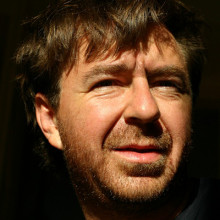Polish literature

Marek Kochan
Born in 1969, a prose writer, playwright and lecturer at Warsaw University; author of the novels Franquizea (1996) and Playground (2007), as well as the short story collection The Ballad of the Good Thug (2005); he has also written a play entitled Argo, which was singled out in 2006 for the audience choice award at the Heidelberg Theatre Festival, and other dramatic texts. He has also written some specialist books: Word Duels. Eristic Techniques in Public Debate (2005), and Slogans in Advertisements and Politics. New Publications (2007); he lives in Warsaw.
In his various books Marek Kochen consistently describes the Polish “here and now,” detailing the specifics of the rapidly changing post-1989 reality. Unlike many of the other writers addressing this topic, however, who explore a fairly grubby sort of realism and focus on the gloomy margins of poverty, the author of The Ballad of the Good Thug tries to show the grotesque and humorous side of the world, and only occasionally sounds a note of tragedy in his books. At the same time, he does not focus on a single type of protagonist or keep returning to the same kind of social group. Kochan’s protagonists are drawn from the whole spectrum of society, from the high-earning employees of the great corporations to the local toughs hanging out on park benches.
In Franquizea the writer takes a motif well known to literature: the main protagonist, Franio Quizo, wakes up on a park bench one day to find he doesn’t know who he is. In trying to find his identity, Franio gets involved in humorous misadventures, enters various roles, takes on different jobs, including university professor and advertising specialist, but also turning into a gangster.
In The Ballad of the Good Thug he depicts a whole gallery of characters, pointing out the absurdities of daily life, dominated by facades, posturing, and struggles for power, respect and position, in which the protagonists of the various stories become hopelessly tangled. In Playground, perhaps the finest piece in the author’s catalogue, the witticisms blend with a bitterness when he tries to analyze the nature of present-day family and male-female relationships. He shows a gradual transformation in roles with figures of men who sit at home and bring up children, while the dynamic women become heads of the family – a shift which is not without its conflicts.
BIBLIOGRAPHY
- Franquizea, Warszawa: Lampa i Iskra Boża, 1996.
- Ballada o dobrym dresiarzu, Warszawa W.A.B., 2005.
- Plac zabaw, Warszawa: W.A.B., 2007.
- Fakir z Ipi, Poznań: Zysk i S-ka, 2013.
- Turban mistrza Mansura, Poznań: Zysk i S-ka, 2014.
-
Martynika i Biała Wyspa, Warszawa: W.A.B., 2014.